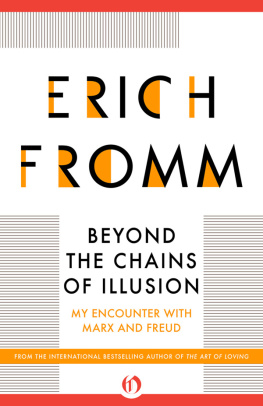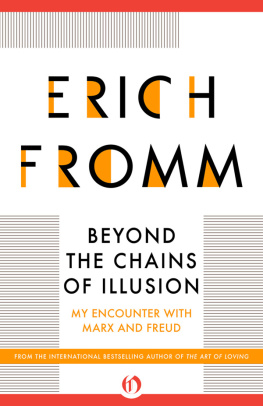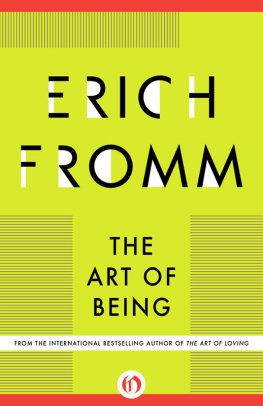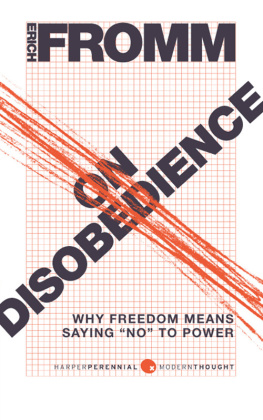Erich Fromm - The Dogma of Christ
Here you can read online Erich Fromm - The Dogma of Christ full text of the book (entire story) in english for free. Download pdf and epub, get meaning, cover and reviews about this ebook. publisher: Open Road Distribution, genre: Religion. Description of the work, (preface) as well as reviews are available. Best literature library LitArk.com created for fans of good reading and offers a wide selection of genres:
Romance novel
Science fiction
Adventure
Detective
Science
History
Home and family
Prose
Art
Politics
Computer
Non-fiction
Religion
Business
Children
Humor
Choose a favorite category and find really read worthwhile books. Enjoy immersion in the world of imagination, feel the emotions of the characters or learn something new for yourself, make an fascinating discovery.
- Book:The Dogma of Christ
- Author:
- Publisher:Open Road Distribution
- Genre:
- Rating:5 / 5
- Favourites:Add to favourites
- Your mark:
- 100
- 1
- 2
- 3
- 4
- 5
The Dogma of Christ: summary, description and annotation
We offer to read an annotation, description, summary or preface (depends on what the author of the book "The Dogma of Christ" wrote himself). If you haven't found the necessary information about the book — write in the comments, we will try to find it.
The Dogma of Christ — read online for free the complete book (whole text) full work
Below is the text of the book, divided by pages. System saving the place of the last page read, allows you to conveniently read the book "The Dogma of Christ" online for free, without having to search again every time where you left off. Put a bookmark, and you can go to the page where you finished reading at any time.
Font size:
Interval:
Bookmark:

The Dogma of Christ
and Other Essays on Religion, Psychology and Culture
Erich Fromm
Contents
I
Foreword
While most of the essays in this volume have been written during the last ten years, the longest paper, The Dogma of Christ, first appeared in German in 1930. Professor James Luther Adams of the Harvard Divinity School made a translation many years ago and suggested that I publish it together with other papers in one volume. He did so in spite of the fact that he was not in agreement with many of my conclusions. He felt, however, that the method and the argument were sufficiently interesting to warrant publication in English. I myself was very hesitant to reissue this early example of my thought. The reasons are obvious.
First of all, it was written in a period when I was a strict Freudian. In the meantime my psychoanalytic views have [VIII] undergone enough of a change so that many formulations in this essay would be different if I wrote them today. Furthermore, I one-sidedly stressed in this work the social function of religion as a substitute for real satisfaction and as a means for social control. While I have not changed my views in this regard, today I would also emphasize the view (which I held then, as now) that the history of religion reflects the history of mans spiritual evolution. A second reason lies in the fact that it is impossible for me today to restudy the whole of the rather complex historical material which is analyzed in this work. In addition, a great number of books on the history of early Christianity have been published since 1930, and any revision of The Dogma of Christ would have to take them into account. I have read much of the literature in, the intervening years and some, like Martin Werners The Formation of Christian Dogma, seemed to give some indirect support to my approach; but a thorough rewriting would go beyond my powers. I agreed to the publication of the paper in its original form when Arthur A. Cohen of Holt, Rinehart and Winston, a scholar of theology and philosophy in his own right, urged me again, together with Professor Adams, to offer it to an English-reading audience. Needless to say, the responsibility for this decision lies with me and not with them.
As far as I know, this is the first work in which the attempt was made to transcend the psychologistic approach to historical and social phenomena so customary in psychoanalytic literature. I had been stimulated by the paper on the same subject written by one of my teachers at the Psychoanalytic Institute in Berlin, Dr. Theodor Reik, who had employed the traditional method. I tried to show that we cannot understand people by their ideas and ideologies; that we can understand ideas and ideologies only by understanding the people who created them and believed in them. In doing this we have to transcend individual psychology and enter the field of psychoanalytic-social psychology. Thus, in dealing with ideologies, we have to study the social and economic conditions of the people who accept them, and try to recognize what I later called their social character.
The main emphasis of this study is the analysis of the socioeconomic situation of the social groups which accepted and transmitted Christian teaching; it is only on the basis of this analysis that a psychoanalytic interpretation is attempted. Whatever the merits of this interpretation, the method of the application of psychoanalysis to historical phenomena is the one which has been developed in my subsequent books. While it has since been refined in many ways, its nucleus is contained in The Dogma of Christ in a way which, I hope, is still interesting.
I have gone over Professor Adams translation and sympathize with the difficulty of translating my rather heavy, academic German into English. Here and there I have made minor changes in wording, but have consistently resisted the temptation to change the contents. Even though many times I would have liked to substitute my present point of view for the older one, a partial revision, I felt, would not have been fair to the reader.
The other essays do not need any comment. In Medicine and the Ethical Problem of Modern Man and The Revolutionary Character, which were originally delivered as addresses, minor changes have been made to prepare them for publication for a general audience. In Sex and Character I have simply eliminated what seemed to me needless repetition.
I am greatly indebted to Professor James Luther Adams for his labor of love in translating The Dogma of Christ, and to Arthur A. Cohen and Joseph Cunneen for their editorial assistance.
E. F.
New York, 1963
II
The Dogma of Christ
I Methodology and the Nature of the Problem
It is one of the essential accomplishments of psychoanalysis that it has done away with the false distinction between social psychology and individual psychology. On the one hand, Freud emphasized that there is no individual psychology of man isolated from his social environment, because an isolated man does not exist. Freud knew no homo psychologicus, no psychological Robinson Crusoe, like the economic man of classical economic theory. On the contrary, one of Freuds most important discoveries was the understanding of the psychological development of the individuals earliest social relationsthose with his parents, brothers, and sisters.
It is true, Freud wrote, that individual psychology is concerned with the individual man and explores the paths by which he seeks to find satisfaction for his instinctual impulses; but only rarely and under certain exceptional conditions is individual psychology in a position to disregard the relations of this individual to others. In the individuals mental life someone else is invariably involved, as a model, as an object, as a helper, as an opponent; and so from the very first, individual psychology, in this extended but entirely justifiable sense of the words, is at the same time social psychology as well.
On the other hand, Freud broke radically with the illusion of a social psychology whose object was the group. For him, social instinct was not the object of psychology any more than isolated man was, since it was not an original and elemental instinct; rather, he saw the beginning of the psyches formation in a narrower circle, such as the family. He has shown that the psychological phenomena operative in the group are to be understood on the basis of the psychic mechanisms operative in the individual, not on the basis of a group mind as such.
The difference between individual and social psychology is revealed to be a quantitative and not a qualitative one. Individual psychology takes into account all determinants that have affected the lot of the individual, and in this way arrives at a maximally complete picture of the individuals psychic structure. The more we extend the sphere of psychological investigationthat is, the greater the number of men whose common traits permit them to be groupedthe more we must reduce the extent of our examination of the total psychic structure of the individual members of the group.
The greater, therefore, the number of subjects of an investigation in social psychology, the narrower the insight into the total psychic structure of any individual within the group being studied. If this is not recognized, misunderstandings will easily arise in the evaluation of the results of such investigations. One expects to hear something about the psychic structure of the individual member of a group, but the social-psychological investigation can study only the character matrix common to all members of the group, and does not take into account the total character structure of a particular individual. The latter can never be the task of social psychology, and is possible only if an extensive knowledge of the individuals development is available. If, for example, in a social-psychological investigation it is asserted that a group changes from an aggressive-hostile attitude toward the father figure to a passive-submissive attitude, this assertion means something different from the same statement when made of an individual in an individual-psychological investigation. In the latter case, it means that this change is true of the individuals total attitude; in the former, it means that it represents an average characteristic common to all the members of the group, which does not necessarily play a central role in the character structure of each individual. The value of social-psychological investigation, therefore, cannot lie in the fact that we acquire from it a full insight into the psychic peculiarities of the individual members, but only in the fact that we can establish those common psychic tendencies that play a decisive role in their social development.
Font size:
Interval:
Bookmark:
Similar books «The Dogma of Christ»
Look at similar books to The Dogma of Christ. We have selected literature similar in name and meaning in the hope of providing readers with more options to find new, interesting, not yet read works.
Discussion, reviews of the book The Dogma of Christ and just readers' own opinions. Leave your comments, write what you think about the work, its meaning or the main characters. Specify what exactly you liked and what you didn't like, and why you think so.


















